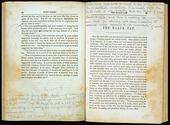Poe, Edgar Allan {poh} Best known for his poems and short fiction, Edgar Allan Poe, born in Boston, Jan. 19, 1809, died Oct. 7, 1849 in Baltimore, deserves more credit than any other writer for the transformation of the short story from anecdote to art. He virtually created the detective story and perfected the psychological thriller. He also produced some of the most influential literary criticism of his time -- important theoretical statements on poetry and the short story -- and has had a worldwide influence on literature.
Daguerreotype, 1848Early Life and Work Poe's parents, David Poe Jr. and Elizabeth Arnold Hopkins, were touring actors; both died before he was 3 years old, and he was taken into the home of John Allan, a prosperous merchant in Richmond, Va., and baptized Edgar Allan Poe. His childhood was uneventful, although he studied (1815-20) for 5 years in England. In 1826 he entered the University of Virginia but stayed for only a year. Although a good student, he ran up large gambling debts that Allan refused to pay. Allan prevented his return to the university and broke off Poe's engagement to Sarah Elmira Royster, his Richmond sweetheart. Lacking any means of support, Poe enlisted in the army. He had, however, already written and printed (at his own expense) his first book,Tamerlane and Other Poems (1827), verses written in the manner of Byron.
Temporarily reconciled, Allan secured Poe's release from the army and his appointment to West Point but refused to provide financial support. After 6 months Poe apparently contrived to be dismissed from West Point for disobedience of orders. His fellow cadets, however, contributed the funds for the publication of Poems by Edgar A. Poe ... Second Edition (1831), actually a third edition -- after Tamerlane and Al Aaraaf, Tamerlane, and Minor Poems (1829). This volume contained the famous To Helen and Israfel, poems that show the restraint and the calculated musical effects of language that were to characterize his poetry.
